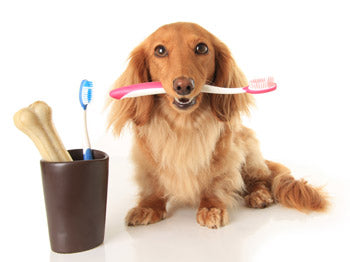According to vets, after the dogs grow older, mainly after the age of 4, most of the canines develop some kind of gum problem. And there are host of other problems that a dog may suffer from, like tooth loss, cavities, abscess or infection. Besides pain, the bacteria can travel via the bloodstream to the vital organs of the body (heart, liver or kidneys) and cause havoc.
What makes it worse is your dog’s inbuilt reluctance inability to express pain. Their ancestors didn’t let pain show in their body language as that would have made them vulnerable to attack. Now, even after years of domestication dogs maintain this attitude. So you should be watchful to any change in the behaviour (like decrease in appetite, waking up at odd hours), and body (like a swelled-up face) in your dog.
There is nothing like regular brushing of the dog teeth. No matter how difficult the dog makes it for you, brushing its teeth is one of the most important responsibilities you have as the pet parent.
Furthermore, there are many ways in which you can ensure an optimum dental health. Some of them are stated below:
1.Crunchy kibble
Dry kibble works like a scrubber for the teeth. While the dog eats it, the nutritious bits of food clean the mouth. The wet food is stickier and more likely to get trapped between teeth, causing decay. Even if your dog prefers the wet over the dry variety, include a dry portion of food in its daily diet.
2.Chew bones and chew toys
There are artificial chew bones and chew toys which have been created to bring better health to the teeth and gums of the dog. Ideally, a dog chew should be soft and flexible, and possess a rough or spiky texture; hard chews can cause broken teeth and other injuries.
Chewing is an innate habit of dogs. The chew bones and toys would satisfy it safely, and would also strengthen the jaws and scrub the surface of the teeth. Moreover, you can also offer real bones, especially knuckle or marrow bones to the dogs, as they are softer.
(It is always recommended to keep a watch over the dog as it chews on bones or toys.)
3.Chew treats
The treats or snacks meant for your furry friend can also assist in maintaining oral health. It would be a win-win situation where you have a yummy eatable which makes your dog happy, gratify its hunger and also works to improve the state of its teeth, gums and breath.
Check the package carefully to see if a dental treat meets the standards of established authorities. Pick the size of the treat according to the size of the dog; bigger the dog, bigger should be the size of the treat.
4.Brushing in instalments
If your dog makes brushing a mammoth task to complete, carry out the task in parts. Right side of the mouth on Monday, left side on Tuesday, centre on Wednesday; repeat the cycle of cleaning on the rest of the days of the week as well.
5.Physical examination at home
At regular intervals check the teeth and gums of your dog, manually. Run your fingers inside the mouth and examine the teeth and gums. Gradually, this will make the dog used to your (well-intentioned) intrusions in its mouth, making brushing less problematic. Also, you will be better acquainted with any changes that take place in the mouth.
6.Dog wipes
You can find dental cleaning wipes/pads in the market to rub away bits of food from the teeth and gums. The scented wipes would also leave a refreshing scent in the mouth. A homemade wipe can be made from a gauze pad; just moisten it slightly and scrub clean the teeth and gums.
7.Veterinary dentist
Regular visits to a veterinary dentist are always recommended.
In conclusion I would like to add that you should always try to make the upkeep of the mouth a comfortable affair for the dog. Doing a daily task for the pet, by putting it under stress is not such a good idea.
In order to gain dog’s patience and co-operation, particularly at the initial stages, give your dog a treat (dental one of course) and lots of praise at the end of every brushing or cleansing session.

